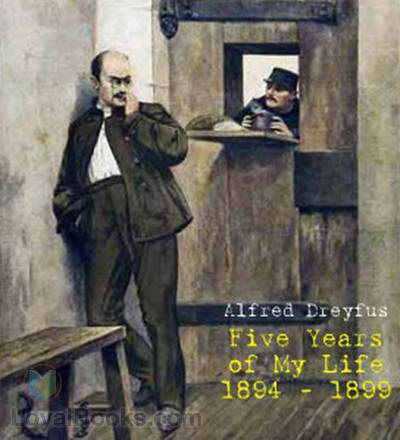
By: Alfred Dreyfus (1859-1935)
In "Five Years of My Life 1894-1899," Alfred Dreyfus gives readers a first-hand account of his harrowing experience of being wrongfully accused and convicted of treason. His detailed recollections shed light on the injustice he faced, the torment he endured, and the resilience he showed throughout his ordeal.
Dreyfus's narrative is both heartbreaking and inspiring, as he recounts the betrayal of his colleagues, the isolation of his imprisonment, and the unwavering support of his family. His writing is raw and honest, providing insight into the emotional toll of his wrongful conviction and the strength it took to maintain his innocence in the face of overwhelming opposition.
This book offers a compelling look at a dark chapter in French history and serves as a powerful reminder of the importance of justice and truth. Dreyfus's story is a testament to the endurance of the human spirit and the power of perseverance in the face of adversity. A must-read for anyone interested in history, justice, and the triumph of the human spirit. Book Description:
Alfred Dreyfus, a Jewish captain in the French Army was court martialed in 1894 on a trumped up charge of treason and condemned to life imprisonment on Devil’s island, a penal colony off French Guiana. His prison diary, published as Five Years of My Life in 1901 is a heroic tale of survival against daunting odds: isolation, deprivation, torture . . Alfred left behind in Paris his wife Lucie, who, forbidden to join her husband in exile, struggled to protect their two children from the rampant anti-Semitism that swirled about them, while she begged her husband to hold onto life as she tried to clear his name. Excerpts from the letters that Alfred and Lucie wrote to each other, between Devil’s island and Paris, are included in Five Years. Their letters are one of the great love stories of all times.
“I live only by feverish will from day to day,” Dreyfus wrote to Lucie on September 4, 1897. Imprisoned in a walled-in hut in brutal heat, for months chained to his bed at night so that he could not turn over, watched 24-hours a day by guards who were forbidden to speak to him, denied books to read or any means of exercising, and only at several months lapse receiving any letters from his wife, (and those often just censored copies), his health rapidly deteriorated, but his determination to survive and prove his innocence remained strong. “Truly,” he writes to Lucie, “were it a question of myself alone, long ago would I have gone to seek in the peace of the tomb forgetfulness of all that I have seen, all of that I have heard . . . But my spirit soon revives, quivering with pain, with energy, with implacable desire for the most precious thing in this world, our honor, the honor of our children, the honor of us all.”
Lucie writes back with passion and courage: (March 6, 1898) . . .”There are moments when my heart is so swollen, when your sufferings re-echo in my soul with such force, so piercingly, that I can no longer control myself . . .With a supreme effort I seek to reach out to you. Then I believe myself to be near you, I speak softly of hope. All too soon, I am awakened from my dream and brought back to reality by a child’s voice . . “
Five Years of My Life speaks to the fortitude, perseverance, and love of Alfred and Lucie Dreyfus, two innocent people snared in a web of evil. It is a book that unquestionably resonates with us today.
|